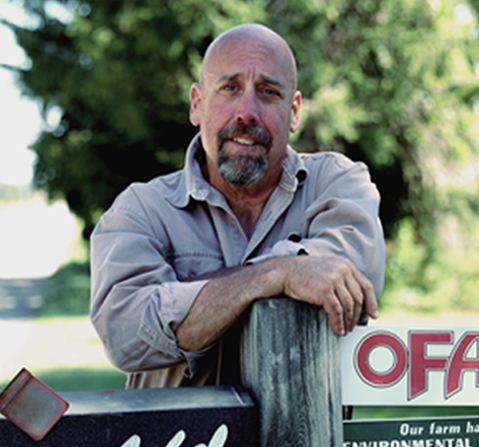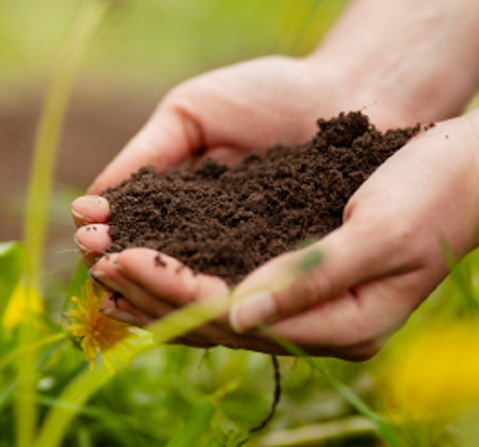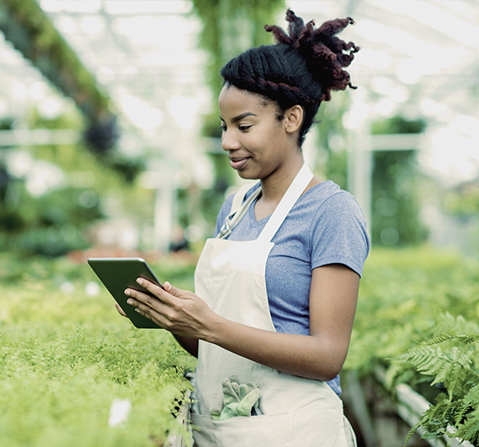Producers, Manning Family Farm, Falmouth, Nova Scotia.
Discover why Dean and Catherine work for a sustainable future
Transcript
I didn't really choose agriculture as a career because it chose me. We have a mixed farm of beef cattle and market vegetables as well as greenhouses. I've got a box of hats up there of probably 20 or 30. So depending on the day – and that includes, you know, being the accountant, being the market analyst, being the soil scientist, being the plant pathologist, being the veterinarian. We're more of a community-based market. So, we kind of identify with our neighbours and our customers because we supply direct to the community. And we've embraced, you know, environmental sustainability. We started with our watercourses. We fenced them out so that the cattle didn't have access. By doing that, we've provided shelter belts for the birds and the different mammals that live here. We've extended our grazing season so that we can keep our animals out on pasture a lot longer, with the goal of year round outside grazing. It's much healthier for the animals and, you know, the environment as well. You look at it with satisfaction, saying you know, I've done something positive here and it's going to be an improvement for what we're doing, but it's going to be improvement for our grandchildren as well.
[Upbeat music begins.]
[A montage begins with an aerial view of a herd of cattle walking through a field, a close-up view of water sprinkling on a bed of crops, a bird fluttering in front of a birdhouse against a tree and a calf eating grass in a field.]
[Images move quickly, the screen divides into nine with images of a pickup truck driving down a dirt road, Dean Manning walking in a greenhouse, a close-up view of a calf eating grass in a field, ending with a full screen of an aerial view of the Manning Family Farm.]
Text on screen: Meet the people behind your food
[A fork and shovel on either side of the title.]
[Dean Manning, in his greenhouse, talks to the camera.]
Text on screen: Dean Manning – Producer, Falmouth, Nova Scotia
Dean: I didn't really choose agriculture as a career because it chose me.
[An aerial view of Dean's family farm and a close-up of their sign 'Manning Family Farm Market' with an arrow pointing in the market's direction.]
We have a mixed farm of beef cattle and market vegetables as well as greenhouses.
[A cow eats grass, hands tucking a small lettuce plant in soil surrounded by a white membrane, and water sprinkling down from a hose over a bed of crops.]
Text on screen: How many hats do you wear?
I've got a box of hats up there of probably 20 or 30.
[Dean drives down a dirt road looking out at the road ahead, with the farm fields to his left, Dean walks amongst his crops in a greenhouse, works on a laptop, uses a tool on a tire in the garage and walks with the cows in a field.]
So, depending on the day and that includes, you know, being the accountant, being the market analyst, being the soil scientist, being the plant pathologist, being the veterinarian.
Text on screen: What makes your operation unique?
[An aerial view of the farm.]
We're more of a community-based market.
[Dean and two others walk together through a crop field, they kneel close to the crops, Dean picks some kale and spinach, eats some spinach leaves, and an overhead view of a crop field.]
So, we kind of identify with our neighbours and our customers because we supply direct to the community. And we've embraced, you know, environmental sustainability.
Text on screen: What are a few of your sustainable practices?
We started with our water courses.
[An aerial view of a creek between two fields and a herd of cattle runs through a field.]
We fenced them out so that the cattle didn't have access.
[An aerial view of a herd of cattle walking along the pasture.]
By doing that, we've provided shelter belts for the birds...
[A bird flutters in front of a bird house against a tree.]
…and the different mammals that live here.
[Chickens stand together in the sunshine, a person pets a cow, a herd of cattle grazing in a field and Dean pats a heifer in the field.]
We've extended our grazing season so that we can keep our animals out on pasture a lot longer, with the goal of year-round outside grazing. It's much healthier for the animals and, you know, the environment as well.
Text on screen: What drives you?
[Dean walks down a path in a field.]
You look at it with satisfaction, saying…
[Dean picks up lettuce seedlings, plants it in some soil underneath a protective cover, an aerial view of a herd of cattle, Dean using a tool on a trailer that is hitched to a pickup truck, and Dean with his wife and son smiling for the camera.
…you know, I've done something positive here and it's going to be an improvement for what we're doing, but it's going to be improvement for our grandchildren as well.
[A calf stands in a field.]
Text on screen: Canadian farmers and agricultural businesses work to feed you and future generations. Discover how they are growing a better future. Canada.ca/Taste-the-Commitment
[Dean smiles and laughs in front of the camera.]
Text on screen: Agriculture and Agri-Food Canada – Agriculture et Agroalimentaire Canada
[Government of Canada wordmark.]
[Upbeat music ends.]
[End]
Learn how Dean and Catherine put sustainability into practice
Transcript
So both Katherine and I went to university and got our degrees in science. She did animal and I did plant science. So it kind of gave us a basis to run the mixed farm operation. We've kind of embraced and encompassed the you know, environmental sustainability on our farm, as well. And we've been doing that for quite a number of years, and we definitely see the benefits. We started with our watercourses. We fenced them out so that the cattle didn't have access to the water itself. By doing that, we've provided shelter belts for lots of the wildlife here. We've also created a much better water quality. That water quality is important to us because we use it to grow our vegetables as well as watering our livestock. And all the aquatic species, you know, it's a fresh, clean source for them. With rotational grazing, instead of having a great big large pasture, we divide it up into smaller pieces so that they eat the grass in that area. We get animal impact on the land. The beauty of that is you're knocking that grass seed down into the soil again, starting a whole new regeneration of of a plant seed population. The other part of that too is creating that wildlife habitat and biodiversity, because you can leave pieces of the grass for some of your species at risk, birds and nesting habitats. So rotational grazing really fits well into our operation. We've extended our grazing season so that we can keep our cattle out on pasture a lot longer through the season and with the goal, if we can, year round outside grazing. It’s much healthier for the animals and, you know, the environment as well. In some of our crops we're using cover cropping so that cattle are grazing the cover crops in November and December before snow falls. And the beauty of that is you're feeding the animals, you're keeping them outside, but you're also providing their green living material for carbon sequestration and greenhouse gas mitigation. And I think that kind of completes the cycle because you’re adding some things to the soil biology by adding the animal on there just with its grazing, its hoof action. And the soil and microbiomes that all interact and have a role to play in that complete life cycle on soil biology and a healthy environment. Farming has kind of taught us a lot of things. I think probably first and foremost is Mother Nature rules the roost.
[Upbeat music begins]
[A montage includes an aerial view of a herd of cattle grazing in a field and Dean Manning and his wife pose for the camera while they stand in a greenhouse.]
So both Katherine and I went to university and got our degrees in science.
[Water sprinkling down from a hose over a bed of crops, a close-up view of people holding lettuce and of a calf eating grass in a field and hands tucking a small lettuce plant in soil surrounded by a white membrane.]
She did animal and I did plant science.
So it kind of gave us a basis...
[An aerial view of the Manning Family Farm and a close-up of their sign 'Manning Family Farm Market' with an arrow pointing to the market's direction.]
…to run the mixed farm operation.
[Dean Manning, in his greenhouse, talks to the camera.]
Text on screen: Dean Manning – Producer, Falmouth, Nova Scotia
We've kind of embraced and encompassed the, you know, environmental sustainability on our farm, as well. And we've been doing that for quite a number of years, and we definitely see the benefits.
Text on screen: Sustainable Agriculture in Action
[An animated fork and shovel appear on either side of the title.]
[Dean walks amongst his crops in a greenhouse.]
Text on screen: What was the first step?
[An aerial view of a creek between two fields and a herd of cattle running through a field.]
We started with our watercourses.
We fenced them out so the cattle didn't have access to the water itself.
[An aerial view of a herd of cattle walking through a field.]
By doing that, we've provided shelter belts for lots of the wildlife here.
[A close-up view of a young fox and of a chipmunk sitting on some wood.]
We've also created a much better water quality.
[A birds eye view of a stream.]
That water quality is important to us because we use it to grow our vegetables as well as watering our livestock.
[Water sprinkling down from a hose over a bed of crops.]
[Dean pats a heifer in the field.]
And all the aquatic species, it's a fresh, clean source for them.
[A close-up view of a creek with a field in the background.]
Texte à l'écran: Can you explain rotational grazing?
[An aerial view of Dean's family farm.]
With rotational grazing, instead of having a great big large pasture, we divide it up into smaller pieces...
[An aerial view of a herd of cattle grazing and a close-up view of a calf eating grass.]
...so that they eat the grass in that area.
[Dean walks amongst some heifers in the field.]
We get animal impact on the land.
And the beauty of that is...
[A herd of cattle grazing in a field.]
...you're knocking that grass seed down into the soil again starting a whole new regeneration of a plant seed population.
[Dean walks down a path in a field and an aerial view of a herd of cattle walking through a field.]
It's much healthier for the animals and, you know, the environment as well.
[A calf eating grass.]
[Dean pats a heifer in the field.]
In some of our crops we're using cover cropping so that cattle are grazing to cover crops in November and December before snow falls.
[A close-up view of a calf eating grass.]
And the beauty of that is you're feeding the animals...
[Dean walks through the field while a herd of cattle feed on the grass.]
…you're keeping them outside...
[An aerial view of a herd of cattle walking through a field.]
…but you're also providing their green living material for carbon sequestration and greenhouse gas mitigation.
[An aerial view of some fields.]
And I think that kind of completes the cycle because you're adding some things to the soil biology...
[A herd of cattle walking through a field.]
…by adding the animal on there just with its grazing, its hoof action.
[A heifer eats grass in a field and a close-up of an angus eating grass.]
And the soil and microbiomes...
[A herd of cattle eating grass.]
…that all interact and have a role to play in that complete life cycle on soil biology and a healthy environment.
Text on screen: What has farming taught you?
[Dean drives down a dirt road, with the farm fields to his left.]
Farming has kinda taught us a lot of things.
[Dean plants lettuce seedlings in some soil underneath a protective cover.]
I think probably first and foremost is Mother Nature rules the roost.
[A close up view of a calf standing in the field.]
Text on screen: Canadian farmers and agricultural businesses work to feed you and future generations. Discover how they are growing a better future. Canada.ca/Taste-the-Commitment
[End]
Text on screen: Agriculture and Agri-Food Canada - Agriculture et Agroalimentaire Canada







